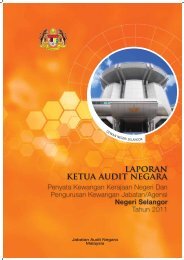Act%20574
Act%20574
Act%20574
You also want an ePaper? Increase the reach of your titles
YUMPU automatically turns print PDFs into web optimized ePapers that Google loves.
Penal Code<br />
159<br />
an alternate or substitute director, notwithstanding any defect in<br />
the appointment or qualification of such person;<br />
“officer” in relation to a company includes—<br />
(a) any director, secretary or employee of the company;<br />
(b) a receiver and manager of any part of the undertaking of<br />
the company appointed under a power contained in any<br />
instrument; and<br />
(c) any liquidator of a company appointed in a voluntary<br />
winding up, but does not include—<br />
(i) any receiver who is not also a manager;<br />
(ii) any receiver and manager appointed by the Court;<br />
or<br />
(iii) any liquidator appointed by the Court or by the<br />
creditors.<br />
Dishonest misappropriation of property<br />
403. Whoever dishonestly misappropriates, or converts to his<br />
own use, or causes any other person to dispose of, any property,<br />
shall be punished with imprisonment for a term which shall not<br />
be less than six months and not more than five years and with<br />
whipping and shall also be liable to fine.<br />
ILLUSTRATIONS<br />
(a) A takes property belonging to Z out of Z’s possession, in good<br />
faith, believing, at the time when he takes it, that the property belongs<br />
to himself. A is not guilty of theft; but if A, after discovering his mistake,<br />
dishonestly appropriates the property to his own use, he is guilty of an<br />
offence under this section.<br />
(b) A, being on friendly terms with Z, goes into Z’s house in Z’s<br />
absence and takes away a book without Z’s express consent. Here, if A<br />
was under the impression that he had Z’s implied consent to take the book<br />
for the purpose of reading it, A has not committed theft. But if A afterwards<br />
sells the book for his own benefit, he is guilty of an offence under this<br />
section.<br />
(c) A and B being joint owners of a horse, A takes the horse out of<br />
B’s possession, intending to use it. Here, as A has a right to use the horse,<br />
he does not dishonestly misappropriate it. But if A sells the horse and<br />
appropriates the whole proceeds to his own use, he is guilty of an offence<br />
under this section.



